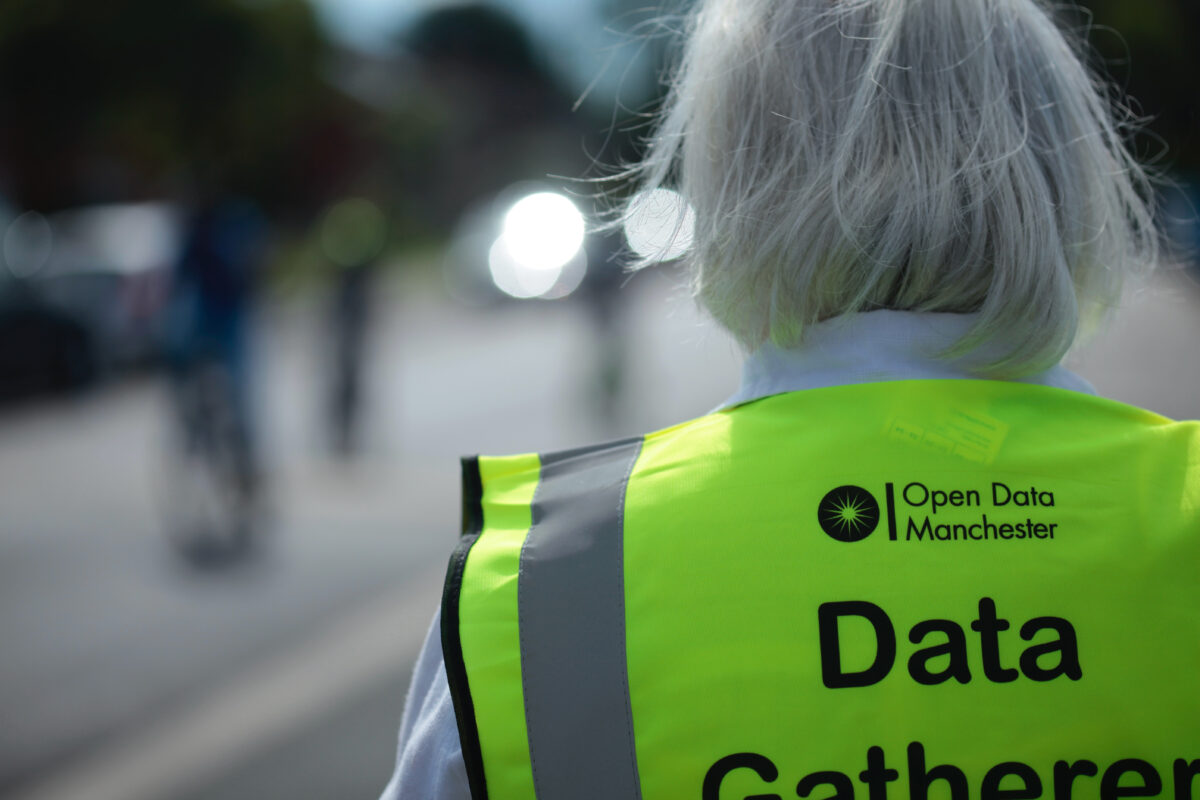This five-part blog series explores Open Data Manchester’s approach to community-led data collection, showcasing our methodology and impact across various projects.
Part 4: Our Streets Chorlton – The Data Champions Model
A Different Approach to Community Participation
While our participatory mapping projects engaged communities through exploration and observation, Our Streets Chorlton (2021-2022) took a different approach. This project focused on traffic patterns and air quality in Chorlton, with the aim of establishing baseline data to evaluate the impact of interventions designed to “green” the local area. Rather than walkabouts and experiential mapping, this project used a “Data Champions” model which involved residents directly in quantitative data collection.
As noted in our previous blog, we exist in a data-rich world where information is constantly collected about our communities, yet accessing and understanding this data often remains challenging for residents. Our Streets Chorlton aimed to bridge this gap by making data collection visible, participatory, and meaningful for residents.
The Data Champions Model
Through initial community workshops, we engaged residents in important decisions about the project. They helped determine what sort of data they wanted to collect, where we should focus our efforts, and what they would need to collect data safely and effectively. While we knew we would use Department of Transport traffic count standards as a minimum, residents told us they also wanted more granular information that reflected their lived experiences.
For example, although the DoT categories cover basic vehicle types, residents highlighted that their streets were regularly used by wheelchairs, mobility scooters, and e-scooters – categories that weren’t captured in official statistics. By incorporating these additional data points, we were able to create a more comprehensive picture of street use while maintaining official standards that could be compared with other datasets.
We then recruited and trained over 40 local residents to become Data Champions, equipping them with:
- Telraam sensors: Small cameras connected to Raspberry Pi computers that count passing vehicles and pedestrians, installed in volunteers’ homes overlooking streets
- Mobile apps: Specialised applications for conducting roadside traffic surveys that timestamp each vehicle passing
- Training: Comprehensive guidance on data collection methods, safety protocols, and basic data interpretation
The Champions then conducted a number of roadside traffic counts in shifts throughout the day and helped monitor and interpret air quality data from sensors strategically placed around the community. Despite sometimes challenging weather conditions, the traffic counting sessions fostered a sense of camaraderie amongst participants as they worked together on this shared community task.
This approach transformed data collection from something “done to” communities into something “done by” communities. One Champion shared after the project: “After a year of being involved, I feel really engaged now with the wider community and up to speed with what’s going on. It’s really connected me to the wider picture.”
Where Perception Meets Data
What makes the Data Champions model particularly effective is how it combines objective measurement with human observation, which revealed insights that neither approach alone would have captured.
One of the most interesting findings came when residents on one street perceived their road as having exceptionally high traffic. The data actually showed volume was similar to comparable streets in the area. But being physically present for the counts revealed the real issue: dangerously high speeds. This first hand observation changed their approach entirely – they engaged authorities with the right questions about speed control rather than volume reduction. Without community participation, this critical insight would have been missed.
Throughout the project, we emphasized that involving the community in data collection was crucial. The act of counting and recording information transformed data from an abstract concept that “others” produce into something tangible, solid and accessible. When residents themselves participated in collecting data, they developed a more concrete understanding of what data is and how it relates to their everyday lives.
The Transformative Power of Participation
When people collect data themselves, they see patterns and nuances that automated collection might miss. The act of standing roadside counting vehicles or checking air quality readings creates a physical connection to information that transforms how people relate to it.
We observed several key impacts among the Data Champions:
- Questioning assumptions: Champions began to test their perceptions against evidence, sometimes confirming and sometimes challenging their prior beliefs.
- Developing data confidence: Participants who felt intimidated by data became comfortable discussing traffic patterns, air quality measurements, and their implications.
- Fostering community connections: The shared experience of collecting and discussing data built relationships among participants who might otherwise never have met.
- Bridging lived experience and policy: Champions could connect their daily experiences (like difficult road crossings or poor air quality) with concrete measurements that policymakers understand.
The project demonstrated how the act of counting, measuring, and analysing creates a personal connection to information. Data becomes a tool for empowerment rather than an abstract concept that feels distant from everyday life.
From Workshops to Walking to Counting
Our Streets Chorlton demonstrated how our Data For Communities principles can be used beyond introductory workshops to support sustained community-led research. By involving residents directly in data collection and interpretation, we showed how communities can move from being passive recipients of data to active creators and owners of information about their neighbourhoods.
In our final blog in this series, we’ll explore how all these approaches – from workshops to mapping to data collection – will work together as part of our expanding Data For Communities programme, and how you might get involved in this work.

